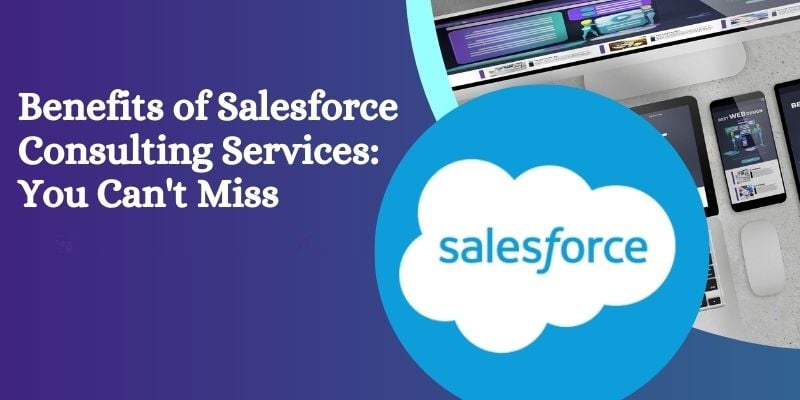The implementation of Salesforce will require a lot of dedication and technical knowledge to reach the intended goals. Theoretically, teams that have received adequate training can apply any software, but Salesforce's learning curve is challenging and will need a considerable amount of time before you can realize the complete capabilities of the software.
Chances of success are increased substantially for businesses that utilize a consultant partner's services to help get up and running using the robust CRM.
Salesforce has gained popularity in the current market, and running Salesforce on your own can prove challenging. This is where Salesforce outsourcing services enter use, with many advantages that can propel your company toward success.
Imagine the possibility of lowering your operational expenses, improving your project management, and having access to a group of skilled Salesforce specialists. There are a handful of the many benefits of outsourcing Salesforce projects to contractors and the way they're changing for all businesses worldwide.
In this article, we'll discuss how Salesforce outsourcing can help you reduce costs, distribute resources, and improve your business in many ways. Let's get started!
Read Also: Salesforce Development: A Comprehensive Guide 2024
Streamlined Implementation
A streamlined implementation is at the core of an effective, seamless integration of Salesforce consulting services into a business structure. By relying on the wisdom of seasoned consultants, businesses can gain access to experience and knowledge, which can significantly speed up the deployment process. They have a thorough comprehension of Salesforce's intricate features and can navigate the complexities of Salesforce with ease and accuracy.
One of the main benefits to hire a Salesforce consultant is that they provide professional advice they offer throughout the entire implementation process. The consultants have years of knowledge, expertise, and specialized education on the table that allows them to provide customized solutions to specific business problems.
Through their knowledge, companies can avoid common errors and improve the Salesforce implementation to maximize efficacy and efficiency.
Additionally, the speed of deployment is an essential aspect of Salesforce consultancy services. Experts are dedicated to speeding up the timeframe for implementation so that organizations can begin reaping the advantages of Salesforce in the shortest time possible. In streamlining procedures, reducing disruptions, and prioritizing important targets, consultants speed the switch to Salesforce and help organizations remain ahead of the game in today's fast-paced business world.
The ability to customize is an additional aspect of an efficient implementation, which is made possible by Salesforce consultancy Solutions. Consultants closely work with clients to learn about their requirements, objectives, and processes.
With this knowledge, they design Salesforce solutions that align with the organization's needs, providing the perfect match that boosts efficiency and business growth. When setting up modules, developing customized objects, or creating workflows, the consultants can modify Salesforce so businesses can perform at their best.
Also Read: Business Needs to Hire a Salesforce Developer:Why?
Maximizing Salesforce ROI
Maximizing the return on investment (ROI) through Salesforce is a multi-faceted strategy that includes optimizing usage, cost-saving measures, and long-term strategic plans. Ultimately, the focus is on using the full power of Salesforce's abilities to create the growth and value of Salesforce for business.
Before all else, optimizing utilization is the most critical factor in maximizing the Salesforce ROI. This means ensuring that every feature and function included in the Salesforce platform is used effectively to fulfil the particular requirements and goals of the business.
Salesforce comes with various functionalities and tools, ranging from CRM (customer relationship management) (CRM) to marketing automation, analytics and. By leveraging these capabilities to the fullest extent, companies can streamline procedures, increase productivity, and boost overall efficiency.
Salesforce consultants play an essential part in this process, offering guidance and knowledge to help businesses determine and apply the most efficient solution tailored to their specific needs.
Reduced costs are another essential element in maximizing Salesforce's ROI. Through reducing wasteful expenditure and maximizing resource allocation. This could mean finding and eliminating unnecessary or ineffective functions, maximizing the licensing and subscription model, and negotiating new contracts with Salesforce or third-party suppliers.
In addition, Salesforce consultants can conduct comprehensive cost-benefit studies to determine ways to save money and improve efficiency within the business.
A long-term strategy is crucial to maximize Salesforce ROI and ensure long-term increases. This requires establishing a comprehensive strategy that coordinates Salesforce initiatives with the larger goals and strategies for growth.
If you take a proactive, strategically-oriented approach toward Salesforce integration and optimization, companies can ensure the future of their investment and set themselves up to be successful over the long term. Salesforce consultants can provide vital information and advice in this field, helping organizations develop and carry out strategies that promote growth in innovation and a competitive edge.
Read About: How To Become a Salesforce Developer in 2024
Enhanced User Adoption
Increased user acceptance is the key to realizing the full power of Salesforce in an organization. This requires empowering employees to use and benefit from the Salesforce platform within their everyday activities, thereby increasing the business's effectiveness, productivity, and overall success.
To increase users' adoption, the most critical aspect is offering extensive training and assistance to ensure that teams have the skills required to utilize Salesforce efficiently. This means providing customized training plans tailored to various user groups' organizational requirements and abilities.
Whether it's essential navigation capability or more advanced capabilities and customization, investing in solid programs for training ensures that staff possess the necessary knowledge and skills to make the most of their experience with Salesforce.
In addition, continuous support tools, including User guides, online videos, and helpdesk support, can be crucial in answering questions, solving problems, and encouraging an environment of continual improvement and growth.
Change management also has an essential role in encouraging increased user acceptance of Salesforce. Moving to a new platform is challenging for staff members if they're familiar with old methods or platforms.
Strategies for managing change effectively aid in smoothing the transition and lessening opposition by educating employees about the advantages of Salesforce, addressing issues, and involving all critical stakeholders in the transition process.
This could include performing assessments of change readiness, developing communication strategies, and providing specific support and tools to assist employees in adjusting quickly.
Additionally, encouraging an environment of constant improvements is vital to sustain increased user engagement in the long run. This means establishing ways to gather and incorporate user feedback to inform improvement and improvements for Salesforce.
Iterative feedback loops allow organizations to pinpoint areas of pain to address usability issues and prioritize feature requests, eventually improving user engagement and satisfaction. In actively seeking out and implementing user feedback, they can prove their dedication to responding to employees' ever-changing needs and maximize the use of the Salesforce tool for business.
Also Read: How Much Cost Salesforce Implementation
Customization and Integration
Customization and integration are essential components of harnessing Salesforce to maximize its potential in an organization, which allows companies to tailor Salesforce to the specific requirements of their business, seamlessly integrate it with the existing system, and create the foundation for the future.
One of the significant advantages of customization is its capability to customize Salesforce solutions to suit particular business needs. Each business is unique in its procedures, workflows, and goals. Salesforce's flexible nature allows for a wide range of modifications to accommodate the requirements of these organizations.
When configuring particular objects, implementing custom workflows, or creating customized applications, companies benefit from Salesforce's powerful ability to customize solutions that increase effectiveness, boost productivity, and encourage development.
By adapting Salesforce to suit the specific demands of their business, they can maximize the benefits from Salesforce and get an advantage within their respective industries.
Integration seamlessly is a critical element of using Salesforce effectively in an organization. Most businesses already have equipment and systems installed, so connecting Salesforce with the systems in place is hard to maintain a smooth flow of data and seamless operations throughout the company. Salesforce provides a variety of integration options.
These include built-in connectors, API middleware, and connectors, making integrating Salesforce with almost any software or system possible. By integrating Salesforce into existing systems like ERP, marketing automation, or customer support systems, companies can consolidate the needed data, streamline processes, and have a comprehensive business overview.
The seamless integration allows businesses to take advantage of the capabilities of Salesforce while maintaining a seamless integration with their current technologies.
In addition, scalability is a vital aspect to consider when designing and integrating Salesforce inside an organization. When businesses grow and evolve in size, their requirements and needs will change, and Salesforce has to be able to adjust to the expansion. Salesforce's cloud-based design and adaptable design make it flexible, allowing businesses to extend their platform usage when needed without jeopardizing performance or security.
It doesn't matter if it's adding more users and features or scaling data storage and processing capabilities. Salesforce will quickly adapt to business's changing needs and help them achieve their goals for growth over the long term.
Read About: Custom Salesforce Development Helps Business
Data Management and Analysis
Analyzing and managing data are essential to leveraging Salesforce efficiently to support an informed approach to decision-making and strategic development initiatives within an organization.
This includes a variety of actions, like the cleansing of data, advanced analytics, data cleansing, and predictive modeling. All of these play a role in gaining actionable insight and anticipating future developments.
The core element of efficiently managing data within Salesforce is cleaning the data. This ensures that it is consistent and accurate throughout the Salesforce platform. It involves identifying and resolving any mistakes, errors, or duplicates in the data to ensure that it is reliable and trustworthy in the analysis process and decision-making.
Utilizing methods for data cleansing, businesses can enhance the accuracy of their data, improve data-driven decision-making, and reduce the risk associated with using inaccurate or insufficient data.
Alongside cleaning data and data cleansing, advanced analytics are essential in unlocking the possibilities of Salesforce data. Utilizing powerful analytics methods and tools, businesses can gain actionable insight from their data to support strategies and boost business. Advanced analytics capabilities inside Salesforce let enterprises discover patterns, trends, and patterns within their data.
This allows the company to make better decisions, recognize opportunities to improve, and resolve problems before they become more severe. Whether analyzing customer behavior and trends in sales forecasts or enhancing marketing campaigns, advanced analytics tools allow organizations to get the most value out of Salesforce's information.
In addition, predictive modeling can be the future of data analytics in Salesforce and allows organizations to predict the outcomes and trends of the future by analyzing past data and predictive algorithms. Through predictive models, organizations can gain insights into the behavior of their customers quickly, along with market trends and business performance.
This allows businesses to adapt and improve their strategies to exploit new opportunities. Predictive modelling will enable businesses to keep ahead of the curve and sustain expansion in a constantly changing market, whether it's predicting the rate of customer churn, forecasting sales revenues, or maximizing the amount of inventory.
Read Also: Salesforce Integration Solutions: Key Benefits, Features, and Approaches
Enhanced Customer Experience
A better customer experience is essential in today's competition-driven marketplace, and Salesforce has various features and tools that assist organizations in providing excellent customer service and satisfaction. The Salesforce suite of tools includes
-
consolidating customer records to deliver personalized experiences,
-
streamlining the customer's experience with automation and
-
Taking advantage of customer feedback to continually improve offerings and products.
A pivotal element to improve customer service is the notion of 360-degree views of the client by consolidating and centralizing data about customers from different channels and touchpoints inside Salesforce.
In integrating data from other sources like marketing, sales, or customer service social media, businesses have complete knowledge of the preferences of every customer's behavior and interaction with their brand.
This broad view enables companies to tailor their interactions and customize their offerings and services to each client's specific requirements and preferences, ultimately leading to deeper connections and increasing the loyalty of customers.
Automation is critical to streamlining customer processes and ensuring a smooth experience at all points. Salesforce has a wide range of tools for automation, including process builder, workflow rules, and Einstein AI, that enable businesses to automate routine work, workflows, and communication.
Through automation of processes like lead nurture, order processing, and customer support, organizations can save time and money, cut down on mistakes made by hand, and provide quicker, better customer service. It increases efficiency and performance and improves customer satisfaction by reducing frustration and making it more responsive.
Additionally, the feedback loop is vital to continually manage the quality of products and services based on customer feedback. Salesforce has tools for collecting and studying customer input, like polls, surveys, and social listening. These tools let companies collect essential data on customers' satisfaction, preferences, and pain points.
When customers provide feedback across their journey, organizations can pinpoint areas that need improvement, determine the most critical enhancements, and promptly respond to customer complaints. The proactive way of incorporating customers' feedback helps companies remain in tune with their customers' needs and requirements, resulting in constant innovation and differentiation in the market.
Ongoing Support and Maintenance
Maintenance and support on an ongoing basis can be crucial to maximizing the benefits of Salesforce investments and ensuring the continuous success of organizations that use Salesforce. This requires an active strategy to resolve issues swiftly, keeping Salesforce updated with new upgrades and enhancements, and constantly improving processes to increase efficiency and efficacy.
In the first place, timely troubleshooting is vital to resolve any issues or problems that could occur while working with Salesforce. It doesn't matter if it's technical issues, errors, or issues with the system; organizations must have a system for identifying and addressing problems quickly to avoid disruptions and guarantee efficient operations.
It is essential to have the support of a specialist staff or help desk that can respond promptly to queries or issues, as well as give guidance and help to users when needed. When problems are resolved quickly, organizations can keep their productivity high to avoid potential downtime and guarantee a great customer experience using Salesforce.
In addition, keeping Salesforce updated with the latest upgrades and patches is vital to being ahead of the game and benefiting from the platform's most recent capabilities, features, and security improvements.
Salesforce regularly releases updates and patches to fix issues, add new capabilities, and boost general efficiency. Companies must put processes that keep them up-to-date with these changes, evaluate the impact they could have on workflows already in place, and apply these updates promptly.
It could involve thorough tests, educating users about the new features, and communicating the changes efficiently within the business. In maintaining Salesforce up-to-date, companies can be sure that they're maximizing the return on their investment and are utilizing all the capabilities of Salesforce for business growth.
Additionally, continual improvement is crucial to fine-tune processes and workflows in Salesforce to increase efficiency and productivity as time passes. It involves analyzing and reviewing information about usage patterns and determining areas that could be improved, as well as implementing adjustments and optimizations to streamline processes, automate repetitive tasks, and eliminate obstructions.
Salesforce offers tools and features like Analytics dashboards, workflow automation, and process automation that allow companies to maximize their platform usage continually. With a focus on continual improvement and advancement, businesses can be flexible, adjust to the ever-changing requirements of their business, and achieve steady growth and prosperity through Salesforce.
The Key Takeaway
In the end, Salesforce consulting services offer many advantages that are essential for firms that want to succeed in a crowded market. From simplified implementation and maximizing return on investment to improved user engagement and continuous support, Salesforce consulting services offer the necessary expertise and resources to maximize the potential of the Salesforce platform.
By embracing integration, customization with data management, and improving customer experiences, companies improve efficiency, increase productivity, and provide exceptional value to their clients.
Through a proactive approach towards regular support, maintenance, and continual optimization, organizations remain at the forefront as they adapt to evolving marketplace dynamics and enjoy continuous success through Salesforce.
The bottom line is that investing in Salesforce consulting isn't solely about setting up an ERP system but about changing businesses, strengthening teams, and creating unbeatable customer experiences that will lead to sustainable growth and success.
FAQs
1. What are the principal benefits of using Salesforce consultation services?
Salesforce consulting services provide many benefits, such as customized solutions, expert knowledge in Salesforce customizing the platform, seamless integration to current systems, and continual service to maximize efficiency. The services allow businesses to increase the value of Salesforce and meet their goals quickly.
2. What are the ways that Salesforce consultancy services improve business processes?
Salesforce Consulting Services assists with implementation and strategic direction for businesses to streamline their procedures, boost efficiency in workflow, and increase overall efficiency. With Salesforce's extensive functions and capabilities, organizations can automate tasks, obtain essential insights from data analytics, and enhance the management of customer relationships to ensure long-term expansion.
3. What benefits do Salesforce consulting services provide regarding customer service?
Salesforce consulting solutions help companies create exceptional customer experiences by creating customized solutions to cater to customer's specific requirements and preferences. From personalization of communications to speedy solutions to issues, these services allow businesses to develop more solid relationships with their clients, which results in increased customer satisfaction and retention.
4. What are the ways that Salesforce consulting services help the growth of revenue?
Salesforce consulting services help with revenue growth by optimizing sales processes, finding new revenue opportunities, and enhancing strategies for customer retention. With Salesforce's powerful marketing and sales tools, firms can target prospective customers to streamline sales cycles and profit from cross-selling or upselling possibilities to accelerate revenue generation.
5. What maintenance and support can companies anticipate from Salesforce Consulting Services?
Salesforce consulting services provide ongoing service and maintenance that ensures you get the best performance, capacity, and scalability of Salesforce solutions. It includes frequent system updates, assistance with troubleshooting, user training, and access to technical experts to resolve any problems or changing business requirements. Through a wide range of support services, businesses can rely on Salesforce for sustained development and growth.












Share this blog